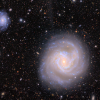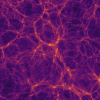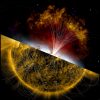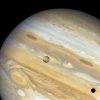Instituto de Astronomía Teórica y Experimental

Teléfono: 54 351 433 1066 – Fax: Int. 101 – iate@oac.unc.edu.ar -Laprida 854, Córdoba, Argentina

Teléfono: 54 351 433 1066 – Fax: Int. 101 – iate@oac.unc.edu.ar -Laprida 854, Córdoba, Argentina

This research area focuses on studying the properties of our galaxy, the Milky Way, as well as other galaxies in the universe.
Read More
The Stellar Astrophysics research area focuses on studying stellar clusters as determiners of structure, formation, chemical evolution, dynamics and kinetics of different components of the Milky Way and the Magellanic Clouds.
Read More
This research area deals with large-scale distribution of matter in the Universe, ranging from smaller scales of galaxies to vast cosmic networks of filaments, voids, and superclusters.
Read More
Research on astrophysical plasma is focused on investigating ionized matter that makes up most part of the visible universe.
Read More
This research area focuses on examining the formation, evolution, and description of planetary systems, including our very own Solar System and other exoplanets orbiting other stars.
Read More